China's Deng wins BMX freestyle women's park gold at Paris Olympics
China's Deng Yawen wins BMX freestyle women's park gold at the Paris Olympics.
China's Deng Yawen wins BMX freestyle women's park gold at the Paris Olympics.
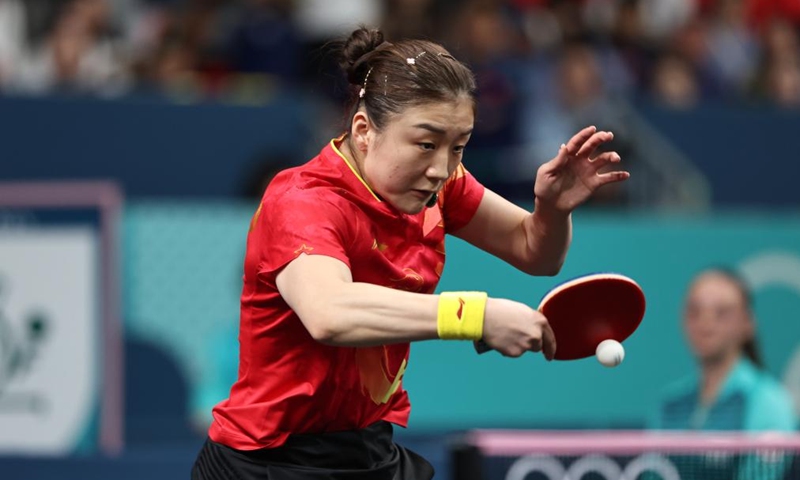
Chinese table tennis Olympic champion Chen Meng urged fans to appreciate the athletes' determination and approach competition outcomes with a balanced perspective, rather than focusing solely on the results.
Chen, the newly crowned women's singles Olympic champion, made the remarks during an interview after China advanced to the semifinals of the women's table tennis team event at the Paris Olympics on Wednesday, while responding to a question about the recent crackdown by China's public security and cyberspace administration departments on illegal activities within sport fan communities.
Chen herself faced much pressure during her women's singles final match against Sun Yingsha, as many fans on the stand showed favoritism toward Sun while booing Chen.
A 29-year-old woman surnamed He was detained by the police for posting inflammatory and defamatory comments about Chinese athletes and coaches on Sina Weibo, following the table tennis women's singles final at the Paris Olympics, according to a circular released by the Beijing police on Monday.
The arrest came after Beijing police received reports from the public about the posts, which were found to be harmful due to their malicious and false nature. The woman has been placed under criminal detention while the investigation continues.
The case highlighted the authorities' efforts to preserve the spirit of sportsmanship and prevent the negative aspects of toxic fan culture from tarnishing the integrity of sports.
Over 300 accounts and influential users that engaged in maliciously speculating about coaches and posting attacks against athletes following the women's singles table tennis final have been banned from posting, according to a notice by Sina Weibo on Sunday.
Chen noted that while fans naturally wish for their favorite athletes to win, it is essential to understand that victories and defeats are inherent in competitive sports, adding that those who follow sports should be mentally prepared to handle these outcomes, as they are an integral part of any sport. Finally, she encouraged fans to appreciate and pay more attention to the athletes' perseverance, passion and resilience.
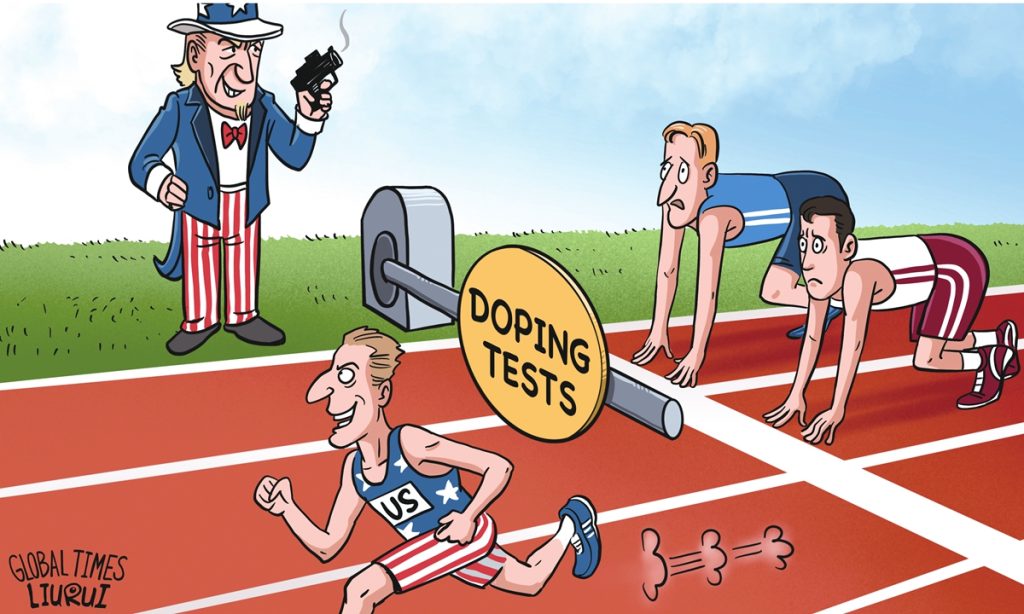
China’s Olympic delegation for Paris 2024 has not only achieved the goal of “zero occurrence” of doping issues, but also marked a phased victory against the US over its anti-doping practices, Liu Guoyong, deputy head of the delegation, told a press conference on Sunday.
The Paris 2024 Olympic Games concluded on Sunday with Team China winning 40 gold, 27 silver and 24 bronze medals, with the result marking the best performance for Team China at an Olympic Games held overseas.
As of August 10, the delegation athletes have undergone a total of 214 doping tests during the Olympic Games, a decrease from the 230 tests conducted during the Tokyo Olympics. The decrease reflects the international anti-doping organization’s recognition of clean Chinese athletes and the effectiveness of China’s anti-doping efforts, Liu said.
Liu emphasized China’s comprehensive efforts in establishing a “clean national team anti-doping ecosystem.” China focuses on building cleanliness in various aspects such as the national teams, training facilities, support teams, food, drugs and nutrition, external support, social environment, competition processes and ethical standards.
Liu noted that the self-awareness among Chinese athletes has increased, and the national teams have strengthened their anti-doping management to reduce doping risks.
The delegation has implemented measures to protect athletes’ rights and interests, ensuring the athletes to participate in the Olympic Games without unfair interference. The delegation has also united with global organizations to oppose politicization of sports and “long-arm jurisdiction” by the US, safeguarding the unity of the international Olympic family, according to Liu.
Chinese swimming athletes have always followed international rules and cooperated with high-frequency pre-competition doping tests, with no positive results, demonstrating their good personal qualities and spirit, earning them widespread respect and recognition, said Liu.
The China Anti-Doping Center remains independent, fair, professional, and authoritative in its work, passing the World Anti-Doping Agency’s on-site compliance review.
The China Anti-Doping Center conducted over 33,000 doping tests in 2023, representing in excess of 10 percent of the global total. The number of doping violations decreased from 92 cases in 2017 to 30 cases in 2023, with the violation rate dropping from 0.53 percent to 0.09 percent, according to Liu.
China’s anti-doping efforts have formed a unique anti-doping governance system with Chinese characteristics, said Liu.
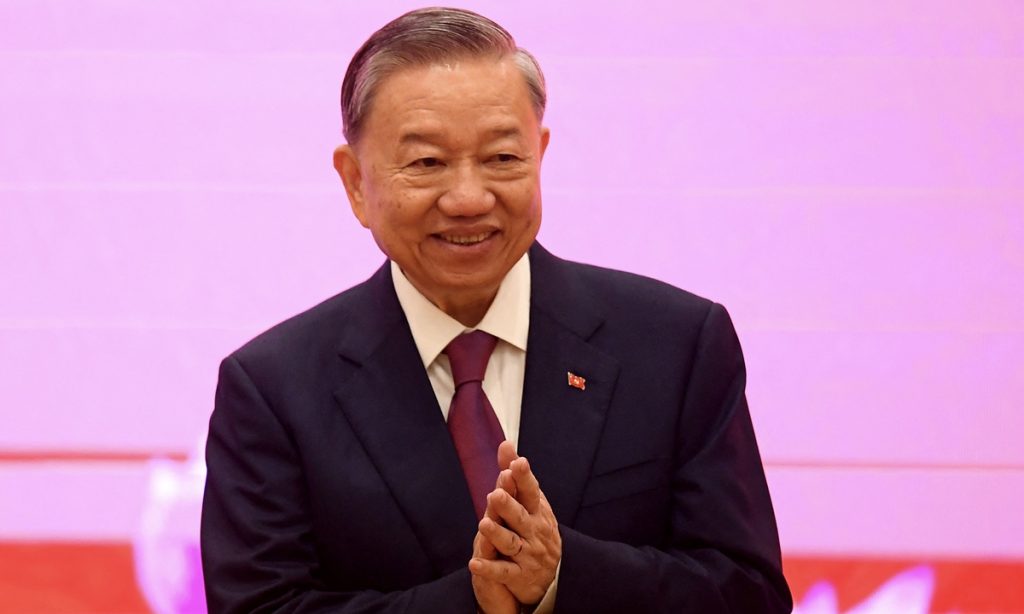
Vietnam's top leader To Lam will make a three-day state visit to China starting Sunday, his first overseas trip since becoming the general secretary of the Communist Party of Vietnam (CPV) Central Committee.
Analysts said the trip shows a continuation of the close relationship between the two countries as developing long-term, stable and sound Vietnam-China relations has always been the strategic choice and top priority of the CPV and the Vietnamese government.
At the invitation of General Secretary of the Communist Party of China (CPC) Central Committee and Chinese President Xi Jinping, General Secretary of the CPV Central Committee and Vietnamese President To Lam will pay a state visit to China from August 18 to 20, Chinese Foreign Ministry spokesperson Hua Chunying announced Thursday.
Lam was elected General Secretary of the CPV Central Committee on August 3, following the passing of former General Secretary Nguyen Phu Trong on July 19. Analysts said that Lam's visit to China underscored the unique and strategic significance of China-Vietnam relations, highlighting that cooperation with China is a top priority of Vietnam's foreign policy in the post-Trong era.
President Xi will meet Lam during his visit to China. Premier Li Qiang, Chairman Zhao Leji of the National People's Congress Standing Committee, and Chairman Wang Huning of the Chinese People's Political Consultative Conference National Committee, will meet with Lam respectively, the spokesperson of Chinese Foreign Ministry said on Thursday.
China and Vietnam are working intensively to implement the outcomes achieved during Xi's historic visit to Vietnam at the end of last year, the spokesperson said, adding that efforts to build the China-Vietnam community with a shared future that carries strategic significance have had a good start, said the spokesperson.
Noting that China is the first country that Lam will visit after becoming the general secretary of the CPV central committee, the spokesperson said this fully demonstrates the great importance that he attaches to the relations between the two parties and countries.
"Through this visit, China looks forward to carrying forward traditional friendship, deepening the building of the China-Vietnam community with a shared future, and working with Vietnam to achieve success on our respective socialist paths toward modernization with distinctive characteristics, jointly advance the global socialist cause, and contribute to regional and global peace, stability and development," said the spokesperson.
China-Vietnam relations have a rich and positive legacy. Since the normalization of relations in 1991, Vietnam's leaders have adopted a pragmatic foreign policy toward China, leading to steady progress in the relationship. With Lam taking over, the most important task is to ensure a smooth transition and build on this positive legacy, Feng Chao, director of the Institute of South and Southeast Asian Studies in Shanghai International Studies University, told the Global Times.
Maintaining strong ties with China is highly beneficial for Vietnam's industrialization and modernization, especially given the current economic development challenges the country faces, said Feng.
By choosing China as Lam's first overseas visit, Vietnam has reaffirmed the significant role China plays in its diplomacy and the enduring friendship between the two parties. The relationship between the CPC and CPV will steer the development of bilateral relations, highlighting that strong party ties continue to be a key feature of the current China-Vietnam relationship, Ge Hongliang, vice dean of the ASEAN College at the Guangxi Minzu University, told the Global Times on Thursday.
Ge said that Lam is expected to have in-depth discussions with Chinese leaders on further developing relations between the CPC and CPV, with new consensus possibly being made.
One of the main goals of Lam's visit to China is to engage in high-level strategic dialogue with Chinese leaders on future cooperation. In addition to reconnecting with old friends, new connections will be established, Xu Liping, director of the Center for Southeast Asian Studies at the Chinese Academy of Social Sciences, told the Global Times on Thursday.
As both China and Vietnam are socialist countries and led by communist parties, Lam's visit is key to deepening mutual understanding. It also aims to shape the development of the China-Vietnam community with a shared future, said Xu.
China and Vietnam have maintained high-level interactions in recent years. In December 2023, President Xi paid a state visit to Vietnam, during which Xi and then general secretary of the CPV Central Committee Trong announced the building of a China-Vietnam community with a shared future that carries strategic significance.
Analysts are highly anticipating Lam's visit, which will advance the China-Vietnam community with a shared future that carries strategic significance. They believe it will not only deliver tangible benefits to both nations but also provide significant certainty, confidence, and momentum for regional development.
In addition to economic cooperation, China and Vietnam will also hold discussions covering core issues, particularly maritime issues, said Xu.
Balanced diplomacy unchanged
The US and some Western countries are closely watching Lam's visit to China.
Ge noted that Lam's visit underscores Vietnam's balanced foreign policy, termed "bamboo diplomacy" and honed under the late general secretary Trong, remains unchanged.
Despite facing challenges and pressures, Vietnam has effectively integrated into the international community and regional value chains by maintaining a non-aligned stance, said the expert, noting that being committed to an open and inclusive model of international relations, Vietnam aims to enhance its global standing to foster economic development and achieve long-term national goals.
"This strategy supports Vietnam's autonomy while contributing to regional and global stability," said Ge.
Since becoming president in May, Lam has visited Laos and Cambodia. He also met with Russia's President Vladimir Putin during Putin's visit to Hanoi in June and spoke with him by phone on August 8 after assuming his role as party leader.
Amid rising protectionism from Europe and America, Vietnam, like China, faces challenges from the US and Europe's "small yard and high fence" strategy, analysts said.
Strengthening cooperation between regional countries and developing countries are crucial for addressing these issues effectively, observers said, calling for more cooperation and exchanges between China and Vietnam.

A 71-year-old man in Southwest China's Sichuan Province ran two kilometers to escape after being attacked by a black bear, with the distance between the man and bear at one point being only one meter, according to recent local media reports.
The man, surnamed Lan, was out in nearby mountains to gather matsutake mushroom. As Lan ascended a slope, he suddenly spotted a black bear resting on the flat ground. With just a mere meter separating them, Lan found himself face-to-face with the bear, according to his daughter, as reported by media on August 9.
Before he could react and move, the bear lunged at him. In the ensuing struggle, the bear swiped at the right side of Lan's face with such force that it tore skin and flesh from his face. The overwhelming strength of the bear rendered Lan defenseless.
However, the black bear's attack lasted for a while and paused. Lan noticed that the bear itself had a leg injury upon seeing the bear run away. Lan then hurriedly got up to escape, took off his clothes, wrapped his face wound to stop the bleeding, and fled the scene by running for two kilometers down the river. During this time, he called his wife for help.
Nearby herdsmen then discovered Lan covered in blood, and after his family members arrived, he was taken immediately to hospital. According to the report, Lan was diagnosed as displacement of the soft tissues in his face, severe fractures, and partial collapse of facial bones. One side of the nostril has been displaced.
Doctors suggested that if someone is injured by a wild animal in the wilderness, they should promptly observe the wound and stop any significant bleeding by applying pressure with clothing or using items like ropes or rubber bands to restrict blood flow.
In the event of a fracture, individuals can stabilize the affected area with nearby items such as wooden boards to prevent further harm to blood vessels, nerves, and tissues. Seeking medical attention promptly is of crucial importance.

Six people were killed and 10 injured after a gazebo was struck by lightning and collapsed in a town in Changzhou city, East China’s Jiangsu Province on Sunday evening.
According to a statement released by the Jiangsu Changzhou Economic Development Zone on Monday morning, Hengshanqiao township in the economic development zone was hit by severe convective weather on Sunday evening. The strike caused the collapse of a gazebo in Fangmaoshan Park while residents were seeking shelter from a rainstorm.
Following the incident, multiple departments including the local public security, emergency response, firefighting and health authorities immediately launched an all-out effort in rescuing the injured.
As of the search and rescue work concluding at 11 pm, a total of 16 people got injured in the incident and were sent to hospital for treatment. Among them, six were severely injured.
As of 2 am Monday, the six severely injured victims succumbed to their injuries despite extensive rescue efforts. The remaining 10 injured are in stable condition.
Specialized personnel have been arranged to provide support to the injured and the families of the deceased, the statement said.
According to the statement, the investigation into the incident is still ongoing, and steps are being taken to address the aftermath. Next, a comprehensive inspection of public facilities in the area will be launched to ensure public safety.
Information released by an official government WeChat account shows that the collapsed gazebo has been open to the public since last November and it took two years to build since work began in 2021.
The incident stirred heated discussions online with some netizens commenting that the victims should have left the park as soon as the thunder began at 6 pm on Sunday evening rather than seeking shelter in the gazebo.
Other netizens also questioned the quality of the gazebo and wondered why the gazebo’s lightning rod did not take effect, or whether the gazebo had a lightning rod at all.
According to media reports, the installation of lightning rods needs to be comprehensively considered according to different situations. Installing a lightning rod to gazebos in open areas such as mountains, lakes, and seaside locations is generally viewed as a safer choice. And precautions against lightning should be taken if gazebos were built using either metal or wood. Lightning rods can be installed to public constructions in scenic spots or parks in accordance with related regulations.
The blueprint of the collapsed gazebo should be reviewed to confirm whether the collapsed gazebo had been installed with a lightning rod.
In response to the incident, an official from the local meteorological bureau said that the incident was uncommon and sporadic, with a relatively low probability of occurrence, the Xiaoxiang Morning Herald reported on Monday.
The official also denied speculation among the netizens that the residents playing with their mobile phone in the gazebo had caused the structure to be struck by the lightning, adding that these rumors had no scientific basis.

As Boeing's Starliner remains stranded in space and its airliners repeatedly encounter issues, experts on Thursday questioned the company's technical and management capabilities as a whole, raising doubts over other Boeing products, especially those with military applications that affect peace and stability in the world.
NASA said on Tuesday that it is delaying its next crewed launch to buy more time for Boeing's troubled new Starliner capsule, which has left two US astronauts stuck at the International Space Station (ISS).
Tuesday also marked two months in orbit for the Starliner's test pilots, Butch Wilmore and Suni Williams, whose original plan was to stay about a week at the ISS and then return to Earth in the Boeing capsule by mid-June. However, their journey back home has been delayed due to issues with the craft's thruster as well as leak problems, media reports said.
NASA said in early July that they are waiting for results of new thruster tests, which were supposed to take approximately two weeks. But the results still haven't been announced, and there still isn't any schedule for the return of the astronauts.
The incident came as a surprise to many, as Boeing once had a glorious history as being one of the world's most respected and highly valued conglomerates. It built the Saturn V S-IC first-stage rocket, which propelled Neil Armstrong to the Moon on July 20, 1969, making him the first human to set foot on another celestial body.
"It revealed a serious problem, which is that today's Boeing lacks rigor in its product engineering R&D and verification. Compared with the old times, especially during the Apollo program, Boeing has experienced a serious decline in the aerospace field," Wang Ya'nan, chief editor of Beijing-based Aerospace Knowledge magazine, told the Global Times.
"Many large technology conglomerates in the US like Boeing have obtained significant profits over time through government orders and industry monopolies. But in many engineering fields, especially in areas of complex research and verification, the level of attention given is insufficient," Wang said.
Apart from spaceflights, Boeing has also long been associated with secure air travel, but it has faced a string of issues recently. Boeing said on Tuesday it plans to make design changes to prevent a future mid-air cabin panel blowout like the one in an Alaska Airlines 737 MAX 9 flight in January, which spun the planemaker into its second major crisis in recent years.
The mid-air emergency badly damaged Boeing's reputation, leading to MAX 9 planes being grounded for two weeks, a ban by the Federal Aviation Administration on expanding production, a criminal investigation and the departure of several key executives.
It is worth noting that Boeing is also one of the US military's main contractors, as the company also develops and produces weapons and equipment such as nuclear-armed intercontinental ballistic missiles (ICBMs), fighter jets, bombers, early warning aircraft, patrol aircraft, transport aircraft, helicopters and drones.
It is likely that Boeing's military products may also have serious problems, but these have not been exposed, Wang said.
If that is the case, the US military's combat capabilities will surely be negatively affected, Wang said.
As a longstanding member of the US military-industrial complex, Boeing is very influential in various fields, making its products difficult to replace, a Chinese military expert who requested anonymity told the Global Times on Thursday.
"From a technical point of view, the development and production of many aerospace and aviation products share similar technologies and management models, so it is reasonable to question, for example, whether Boeing's nuclear-armed ICBMs may also have issues? If Boeing's 737 MAX has issues, will Boeing's warplanes also have issues?" the expert said.
Boeing Defense, Boeing's military product subsidiary, was added to China's unreliable entities list and sanctions were imposed in May following its participation in arms sales to Taiwan island.
The island of Taiwan does not have the option of questioning the quality of the arms it buys, because it is treated as a cash cow by the US, observers said.

With the steadfast support from the central government, Hong Kong's tourism sector is poised for a rapid growth. Through continuous innovation efforts, Hong Kong is expected to become a more attractive tourist destination, providing distinctive travel experiences for visitors, and injecting new vitality into local economy.
The arrival of a new pair of giant pandas from the Chinese mainland is expected to spur Hong Kong tourism-related economy, Kevin Yeung, Hong Kong Secretary for Culture, Sports and Tourism of the Hong Kong Special Administrative Region (HKSAR) government, told the Global Times in an exclusive interview in Hong Kong.
According to Yeung, Hong Kong is now gearing up to welcome the arrival of the new couple of giant pandas aged between 5 and 8 years.
The response came as HKSAR Chief Executive John Lee revealed on July 1 that the central government would be sending a new pair of giant pandas to Hong Kong to mark the 27th anniversary of the city's return to the motherland, adding that the two pandas would arrive within months.
Making full preparations
Earlier on July 7, a team led by John Lee and consisting of representatives from the Hong Kong SAR government and Ocean Park set off to the Dujiangyan Base of the China Conservation and Research Center for Giant Pandas in Southwest China's Sichuan Province to put in place arrangements for the pandas.
Yeung, who joined the visiting team led by Lee to visit the giant pandas in Sichuan, said arrangements were being discussed with the Hong Kong and Macau Affairs Office of the State Council and the National Forestry and Grassland Administration.
Noting that Hong Kong locals are looking forward to the arrival of the giant pandas, Yeung emphasized the importance of meticulous and intensive preparations to ensure the pandas' comfort and the role the pandas will play in bringing the peoples from Hong Kong and the mainland cities closer.
The two pandas are currently adjusting to their new surroundings at the Dujiangyan Base and will undergo a 30-day quarantine, followed by another 30-day quarantine in Hong Kong before they are ready to meet the public. It is important for them to adapt to their new environment in Hong Kong.
Yeung said the national treasured animals would be housed at Ocean Park in Hong Kong where two previous pairs - An An, Jia Jia, Ying Ying and Le Le stayed. They will be the third pair from the mainland.
The first pair, male An An and female Jia Jia, arrived in the city in 1999 to celebrate the "smooth establishment of the One Country, Two Systems" policy. Ying Ying and Le Le were the second pair that the mainland gifted to Hong Kong in April 2007, sparking a "panda fever" drawing a crowd of 35,000 visitors when they made their official debut to the public at Ocean Park.
Ocean Park is making final preparations for the new pair, including enhancing their living space and providing innovative digital and immersive experiences for visitors. Paulo Pong, chairman of Ocean Park, said he is optimistic about the significant economic impact, citing the success of the first pair of pandas in attracting visitors.
Zeng Jiayan, a Hong Kong resident, told the Global Times that she is looking forward to the arrival of the new pair and suggests naming them "Jian Jian" and "Kang Kang." She believes that the panda passion could have a positive impact on the economy and is hopeful for the possibility of panda cubs born in Hong Kong later.
More discussions are underway with the mainland departments to finalize details, such as potential renaming of the pair. "We are now considering the option of giving them more significant names that resonate with Hong Kong community, perhaps, we may invite the public to pick names for the pair," Yeung said.
Giant panda fever
Visiting pandas has been a must-do experience in Hong Kong for visitors since the first pandas arrived in the city in 1999.The pandas have since become beloved idols in Hong Kong, attracting 1.6 million visitors per year.
Hong Kong Ocean Park said that since the first pair of giant pandas arrived at the resort in 1999, they had brought "countless precious and joyful memories to more than 55 million visitors from Hong Kong and around the world," the South China Morning Post reported.
According to the park's latest annual report, the sale of panda-related merchandise and animal interactive programs amounted to HK$600,000 ($77,000) for the financial year ending on June 30 of 2023, an increase of HK$100,000 from two years ago.
The new pandas are expected to further boost Hong Kong's tourism economy, Yeung said.
With the arrival of the new pair, Hong Kong's tourism industry will embrace new opportunities. Meanwhile, the HKSAR government plan to launch a batch of promotional campaigns to arouse public interest in visiting the pandas.
Hong Kong has the opportunity to boost local economy by leveraging the "panda economy," Yeung said, suggesting that the catering and retail industries could see a significant benefit from this initiative.
"Learning from our counterparts in Sichuan, Hong Kong is ready to embrace the 'panda economy,' leveraging the pandas' popularity to enhance tourism appeal and economic growth. We look forward to welcoming the new ambassadors of friendship and culture, fostering a future of shared prosperity, "Yeung said.
Yeung noted that pandas, with their cheerful nature, are ideal as animal ambassadors.
Tourism officials and business insiders in Hong Kong agreed that the arrival of the pandas was a great opportunity for Hong Kong to capitalize on the popularity of the animals. The chairman of Hong Kong Tourism Board (HKTB) Pang Yiu-kai expresses gratitude to the central government for sending another pair of giant pandas to Hong Kong, labeling the pair as "valuable tourism assets."
Timothy Chui Ting-pong, director of the Travel Industry Council of Hong Kong, told the Global Times that the government and Ocean Park should capitalize on the pandas' popularity by developing panda-themed products and related activities. He also proposed ideas such as selling panda-shaped specialty foods and incorporating the logos of pandas into travel itineraries to attract tourists.
Measures introduced by the central government to bolster Hong Kong's financial, cultural, and tourism sectors will further drive local economic growth, Yeung said.
Hong Kong's tourism sector, a key driver of local economy, will greet a significant upswing in visitors. According to estimates by the HKSAR government, the number of visitors to Hong Kong could reach 50 million by 2024, who will greatly boost local GDP, translating to an economic benefit of about 100 million Hong Kong dollars per 1.5 million visitors.
The Chinese mainland has always been the most important and potential source of tourists for Hong Kong, said Yeung. During the past months, to attract more visitors to Hong Kong, the HKSAR government has earmarked more than HK$1 billion to shore up the tourism sector.
With such efforts, the city has welcomed approximately 21 million tourist trips in the first six months of 2024, surging 64 percent year-on-year. Notably, 16.15 million visitors were from the Chinese mainland, according to the HKTB.
"I hope these visitors will recommend the city to others when they go back home," Yeung said.
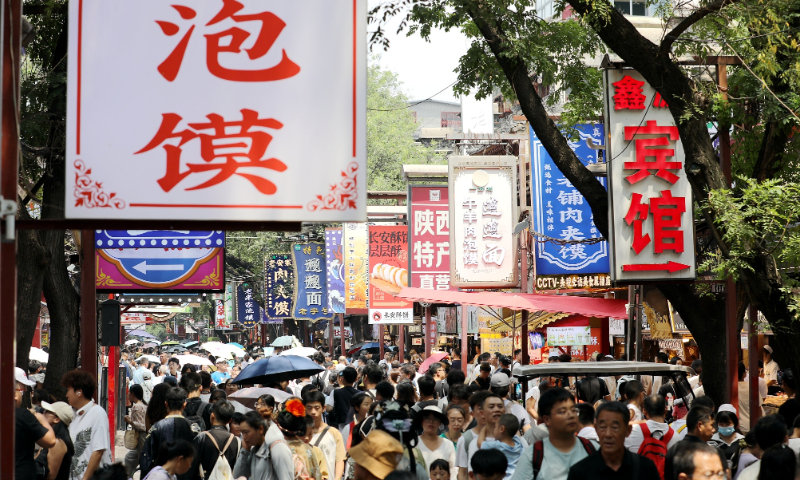
China's railway network has carried more than 500 million passenger trips so far during the summer holidays, according to data released by the country's railway operator on Wednesday, adding to growing signs of strong vitality in China's travel sector, which has become a crucial driver for consumption.
Between July 1 and August 6, a total of 513 million passenger trips were carried by the country's railway network, representing year-on-year growth of 5.4 percent, data from China State Railway Group Co showed. During the period, the daily number of passenger trips averaged 13.86 million, the operator said.
"During this year's summer holiday period, there has been very strong demand for travel," an official with China State Railway Group Co said, pointing to large flows of travel by students and tourists.
Running from July 1 to August 31, the summer holiday period is a peak travel season in China. This year, China State Railway Group Co expects total railway passenger trips will reach 860 million, compared to 830 million trips during last year's summer holiday period.
In addition to railway passenger trips, China's civil aviation industry is also expected to see robust demand during this year's summer holidays. The Civil Aviation Administration of China forecast that air passenger trips will reach 133 million during the period.
The initial numbers suggest that this year's summer travel is widely expected to surpass that of last year, which would offer a great boost for consumption, the biggest driver of economic growth. For some context, during the summer period in 2023, domestic tourism trips reached 1.839 billion, which generated tourism revenue of 1.21 trillion yuan ($168.56 billion), according to the China Tourism Academy.
Since the start of 2024, China has seen a solid tourism boom. In the first half of the year, total domestic tourism trips had already reached 2.725 billion, up 14.3 percent year-on-year, while total tourism spending hit 2.73 trillion yuan, up 19 percent year-on-year, according to the Ministry of Culture and Tourism.
Boosting tourism is part of China's broader effort to increase consumption, which has become a top priority in the country's economic work. Officials have repeatedly said that they will put boosting consumption in a more prominent position so as to ensure stable economic growth.
Analysts said that more policy measures are expected to be rolled out in the second half of 2024 to boost consumption, after recent top meetings stressed the need to take concrete efforts to achieve annual economic growth targets.
A meeting of the Political Bureau of the Communist Party of China Central Committee on July 30, which focused on the economic work in the second half of 2024, noted that the emphasis should be placed on boosting consumption to expand domestic demand, and the focus of economic policies should shift toward bringing real benefits to the people and promoting consumption. The meeting stressed the need to support consumption in cultural tourism, elderly care, childcare, domestic services and other areas.
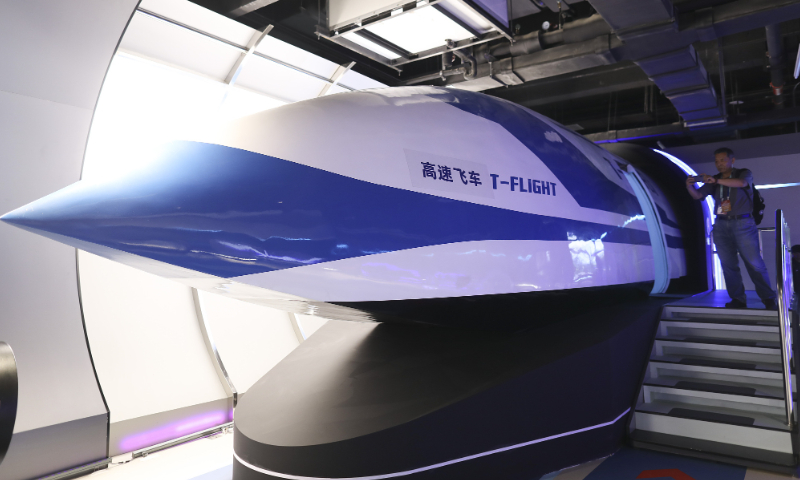
A project in China involving an ultra-high-speed low-vacuum tube maglev transport system, also known as the "high-speed flying train," with a maximum travel speed of 1,000 kilometers per hour, has completed a test for the system's integrated demonstration, showing that the full-sized test line has achieved conditions for its acceptance.
Representatives from the project said that this test improved the overall technical maturity of the system, laying a solid technical foundation for the next test, Science and Technology Daily reported on Monday.
The demonstration was conducted in a low-vacuum tube with a total length of 2 kilometers, the first phase of the project. The test performance and results were in line with predetermined figures, including magnetic suspension travel and brakes, maximum travel speed, and the magnetic suspension height of the vehicle, marking the success of the test.
The "high-speed flying train" may be deployed on commuter routes in mega-city clusters. It could shorten the travel time between Beijing and Shanghai to as little as 90 minutes, said the report.
The successful test indicated the concrete progress of the development of China's ultra-high-speed train, Sun Zhang, a railway expert at Shanghai Tongji University, told the Global Times on Monday. Long-term safety verification work needs to be implemented before it becomes a commonly used public transport system, Zhang said.
The full-sized test line was co-built by the government of North China's Shanxi Province and China Aerospace Science and Industry Corp, and it is located in Yanggao, under Datong. Construction started in April 2022 and wrapped up in November 2023. The project combines aerospace technology and ground rail transportation technology, aiming to create trains with a top speed of 1,000 kilometers per hour.
The concept of a transportation system in a low-pressure tube was proposed in 2013 by Elon Musk, who called it Hyperloop, but his company focusing on developing the system - Hyperloop One - was shut down at the end of 2023, Reuters has reported.
The official website of UK-based Virgin showed that its Virgin Hyperloop made its first successful passenger test in 2020.
Analysts said that it is hard to predict which country will be the first to operate a high-speed maglev train, but it is more practical to make such systems profitable in China, which has a huge population and a solid foundation in rail transport.
As of the end of 2023, the length of China's railways in commercial operation reached 159,000 kilometers, with more than 45,000 km of the total being high-speed lines, official data showed.